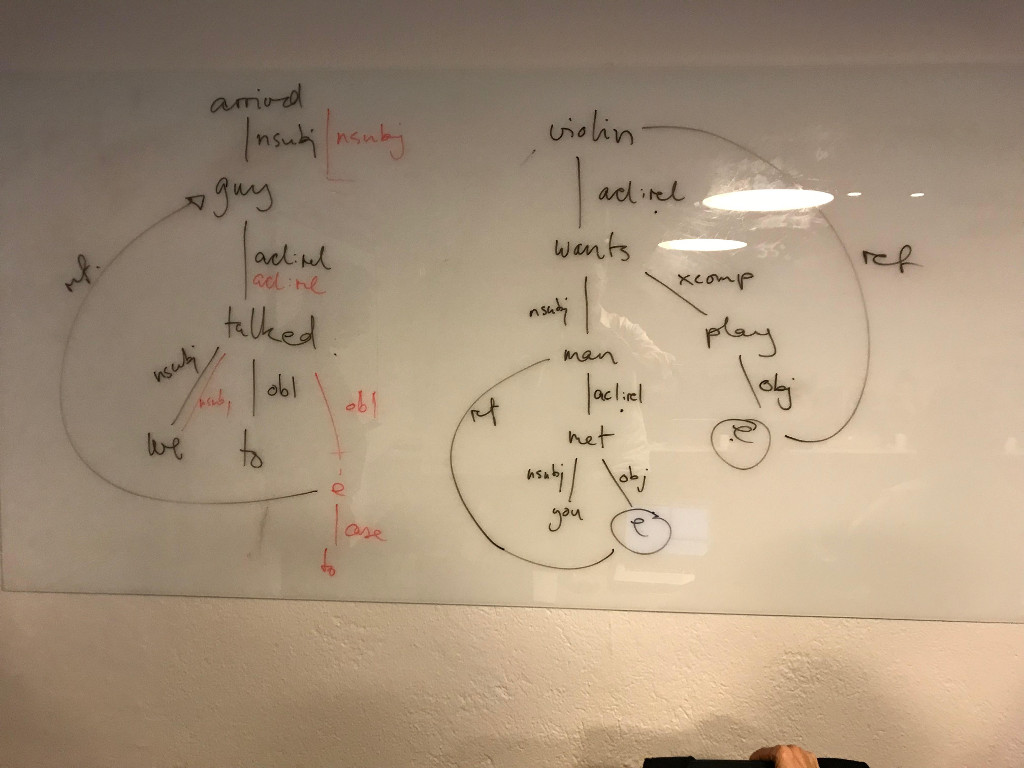SynSem_MeaningConstruction
The SynSem research group at the Oslo Center for Advanced Study (CAS) holds a working meeting with parts of the (enhanced) Universal Dependencies (UD) initiative, to discuss meaning construction on top of UD syntax. The meeting will be held from Monday, March 19, to Wednesday, March 21, 2018, at Hotel Gabelshus in Oslo. We expect to start the programme on Monday morning after breakfast, i.e. encourage everyone to travel to Oslo on Sunday already; on Wednesday, we will wrap up the meeting at lunch time (say 13:00), so that for most people it should be possible to still catch flights back home that day.
| Name | At OSL | From OSL | First Meal | Last Meal | Preferences |
| Johan Bos | Sunday, 18:20 | Wednesday, 17:00 | |||
| Marie Candito | Sunday, 22:30 | Wednesday, 16:45 | |||
| Helge Dyvik | — | — | |||
| Dan Flickinger | — | — | |||
| Meaghan Fowlie | Sunday, 14:00 | Wednesday, 16:10 | vegetarian | ||
| Matthew Gotham | — | — | |||
| Jonas Groschwitz | Sunday, 14:00 | Wednesday, 16:10 | vegetarian | ||
| Jan Hajič | Sunday, 18:20 (KL1149) | Wednesday, 17:00 (KL1148) | |||
| Dag Haug | — | — | |||
| Alexander Koller | Sunday, 14:00 | Wednesday, 16:10 | |||
| Matt Lamm | Sunday, 18:05 | Thursday, 9:00 | |||
| Marie de Marneffe | Sunday, 14:00 | Thursday, 17:55 | |||
| Joakim Nivre | Sunday, 15:00 (SK867) | Thursday, 17:50 (SK884) | |||
| Stephan Oepen | — | — | seafood allergy | ||
| Siva Reddy | Sunday, 16:10 (BA766) | Wednesday, 20:10 (BA769) | no red meat | ||
| Vijay Saraswat | Sunday, 8:15 (SK908) | Thursday, 11:00 (SK907) | |||
| Djamé Seddah | Sunday | Wednesday | |||
| Sebastian Schuster | Sunday, 18:55 (LX1216) | Wednesday, 17:55 (SN2284) | |||
| Dan Zeman | Sunday, 13:30 (DY1503) | Wednesday, 16:30 (QR176) | |||
| Lilja Øvrelid | — | — |
Participants are expected to make their own travel arrangements to Oslo and submit transportation receipts for reimbursement upon completion of the meeting. SynSem has earmarked up to EUR 1000 per participant traveling from outside Europe and up to EUR 400 per participant from within Europe; in case you find it impossible to make travel arrangements to Oslo within these limits, please make contact with Dag and Stephan as soon as possible. Accomodation and meals while in Oslo will be covered by SynSem directly.
Please submit your receipts for travel (airfare and airport transfers) for reimbursement on-line no later than mid-April. After Sunday, April 15, 2018, the Norwegian tax payer can no longer guarantee reimbursements.
We expect to prepare the programme collectively, with presentation (or maybe demonstration) and discussion slots as obvious building blocks. All participants are invited to (though not required) to present on their ongoing work, possibly in collaborating teams. In a first instance, we welcome suggestions for programme elements (of any type, not limited to the above examples), which we will collect incrementally.
| Monday, March 19 | ||
| 9:30 | 10:30 | Alternation-Neutralized Deep Syntactic Graphs (for French) [Marie, Djamé] |
| 10:30 | 11:30 | Enhancing UD Treebanks [Joakim, Sebastian] |
| 12:00 | 13:00 | Homework Review: CCS Enhanced Dependencies |
| 15:00 | 16:00 | (More) Homework Review: CCS Enhanced Dependencies |
| 15:00 | 16:00 | Building Deep Syntax Structures for User-Generated Content [Djamé] |
| 16:30 | 17:00 | Meaning Representations for Quantitative Facts [Matt] |
| 17:00 | 18:00 | Real-World Challenges of Deep Understanding of Professional Level Text [Vijay] |
| 19:00 | Dinner: Jewel of India |
| Tuesday, March 20 | ||
| 9:00 | 10:00 | Universal Typed Semantic Parsing [Siva, Matt, Sebastian] |
| 10:00 | 11:00 | Glue Semantics for Universal Dependencies [Dag & Matthew] |
| 11:30 | 12:30 | Holes in the MRS Composition Algebra [Stephan & Dan] |
| 14:15 | 15:00 | (Even More) Homework Review: CCS Enhanced Dependencies |
| 15:00 | 16:00 | A Constrained Graph Algebra for Semantic Parsing (with AMRs) [Meaghan, Alexander] |
| 16:30 | 17:30 | AMR Dependency Parsing with a Typed Semantic Algebra [Jonas, Alexander] |
| 19:00 | Dinner: Bølgen og Moi Tjuvholmen |
| Wenesday, March 21 | ||
| 9:00 | 10:00 | Towards a Semantic UD [Siva, Matt] |
| 10:30 | 11:00 | Reflections on Syntactico-Semantic Representation [Jan] |
| 11:00 | 12:30 | Discussion |
| 13:00 | Lunch: Villa Paradiso Frogner |
- Where is the dividing line (and relevant literature) between grammaticized (‘obligatory’) control and anaphoric coreference? Some phenomena mentioned: Bare relatives, non-finite ‘relatives’, participial adjuncts, purpose infinitivals, ‘without paying’, pronoun resolution.
- Should additional argument relations in enhanced dependencies be limited to obligatory cases (like control) or should we also include non-obligatory cases (like adjunct participles and infinitives)?
- How to articulate the objectives for and nature of enhanced (universal) dependencies; what is the relation to semantics; parallelism to, say, LFG f-structures? Distinguish ‘localizing’ extant information vs. adding additional information.
- Design choices when adding information: Additional edges vs. more empty nodes; see the image below.
- Revise, extend, and annotate a (preferably multi-lingual) test suite test suite of relevant examplars?
- Which layers of analysis should one expect in (domain- and task-independent) (sentence-level) ‘linguistic semantics’, e.g. predicate–argument structure, argument labeling, scope, word senses, presuppositions, information structure, (anaphoric) coreference, etc.
- Different approaches to (thematic) argument identification: predicate-specific (argument identification or proto-roles) vs. ‘full-fledged’ role inventory (that, possibly, can be interpreted across predicates and languages)?

Home | Forum | Discussions | Events